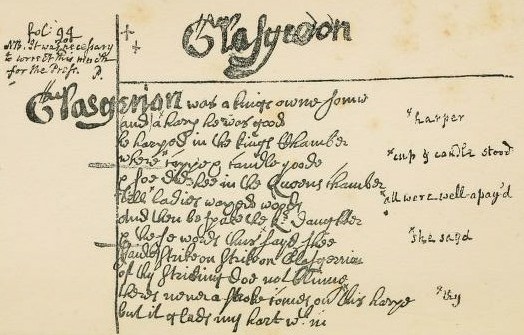The Rocklopedia Fakebandica now has a podcast.
Listen now!
Glasgerion
Bard, harper, and protagonist of the tragic folk ballad "Glasgerion" (Child ballad 67, Roud Folk Song Index 145), collected and printed in Thomas Percy's 1765 Reliques of Ancient English Poetry. Also known in a Scottish variant as "Glenkindie", where his harping skill is so good as to be magical.
A son of a king and skilled harper, he plans a midnight tryst with another king's daughter. But his servant Jack, instead of waking up Glasgerion for the tryst, disguises himself as Glasgerion, goes in place of his master, and rapes the woman. When the truth comes out the next day, the woman kills herself, and Glasgerion kills Jack, and then himself. Wow. So... the moral is... uh... good help is hard to find?
The ye olde folk song got a dusting off in the folk revival of the 1960s. A.L. Lloyd changed the harp to a fiddle, and the character's name, and recorded it as "Jack Orion" on his 1966 album First Person.
No less than Sir Horace Walpole suggested the plot was borrowed by Thomas Otway for his 1680 play The Orphan.
Most accounts link the name to Chaucer's reference to a bard named Glascurion in his circa 1380 poem Hous of Fame (The House of Fame):
Ther herde I pleyen on an harpe
That souned bothe wel and sharpe,
Orpheus ful craftely,
And on his syde, faste by,
Sat the harper Orion,
And Eacides Chiron,
And other harpers many oon,
And the Bret Glascurion
Literary hoaxer Iolo Morganwg tried to conflate Glascurion/Glasgerion with his invented Welsh bard, Geraint the Blue Bard.
